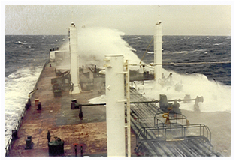APORT (uh-PORT)
On
or toward the port, or left side, of a ship as one faces
forward
Common clues: To
the left, at sea; Left on deck; Nautical direction; Helm
direction; Command to a helmsman
Crossword
puzzle frequency:
once a year
Video: Feel
the Coast Guard
Professional mariners live on the margins of society, with much of their life spent beyond the reach of land. They face cramped, stark, noisy, and sometimes dangerous conditions at sea. Yet men and women still go to sea. For some, the attraction is a life unencumbered with the restraints of life ashore. Sea-going adventure and a chance to see the world also appeal to many seafarers. Whatever the calling, those who live and work at sea invariably confront social isolation.

The
tanker SS Overseas Alice takes seas over the bow during a 1981 run
from New Orleans to Panama.
Findings by the Seafarer's International Research Center indicate a leading cause of mariners leaving the industry is "almost invariably because they want to be with their families." U.S. merchant ships typically do not allow family members to accompany seafarers on voyages. Industry experts increasingly recognize isolation, stress, and fatigue as occupational hazards. Advocacy groups such as International Labor Organization, a United Nations agency, and the Nautical Institute seek improved international standards for mariners.
One’s service aboard ships typically extends for months at a time, followed by protracted shore leave. However, some seamen secure jobs on ships they like and stay aboard for years. In rare cases, veteran mariners choose never to go ashore when in port.
Further, the quick turnaround of many modern ships, spending only a matter of hours in port, limits a seafarer's free-time ashore. Moreover, some seafarers entering U.S. ports from a watch list of 25 countries deemed high-risk face restrictions on shore leave due to security concerns in a post 9/11 environment. However, shore leave restrictions while in U.S. ports impact American seamen as well. For example, the International Organization of Masters, Mates & Pilots notes a trend of U.S. shipping terminal operators restricting seamen from traveling from the ship to the terminal gate. Further, in cases where transit is allowed, special "security fees" are at times assessed.
Such restrictions on shore leave coupled with reduced time in port by many ships translate into longer periods at sea. Mariners report that extended periods at sea living and working with shipmates who for the most part are strangers takes getting used to. At the same time, there is an opportunity to meet people from a wide range of ethnic and cultural backgrounds. Recreational opportunities have improved aboard some U.S. ships, which may feature gyms and day rooms for watching movies, swapping sea stories, and other activities. And in some cases, especially tankers, it is made possible for a mariner to be accompanied by members of his family. However, a mariner’s off duty time at sea is largely a solitary affair, pursuing hobbies, reading, writing letters, and sleeping.
This article is licensed under the GNU Free Documentation License. It uses material from the Wikipedia article "Sailor".
|
|